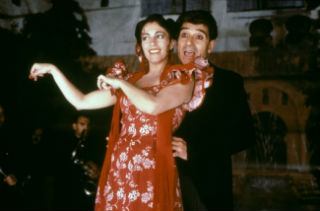
I think the story told in ¡Ay,
Carmela! despite being typically Spanish, is a universal and
timeless story. It is the story of those who, like most people that
were involved in a war, try to survive. Carmela's tragedy is that
she is incapable of doing what Paulino does; adapting like a
chameleon to any circumstance. Carmela, who is more passionate,
more elementary perhaps, cannot remain silent; her rebelliousness
against injustice and cruelty drag her to her death [...]
During the Spanish Civil war I was a child who watched,
frightened, the horror of the ongoing conflict. The bombs, hunger
and death were part of day-to-day life and inevitably marked me. As
a witness of all that, I have tried to narrate in images what I saw
and heard, recovering the memory of those times of war, clinging to
my fleeting memory - which I thought was clear as a photograph and
yet albeit faded easily in the fog - in an attempt to exorcise the
violent images that marked my childhood. Therefore the gestures and
attitudes, voices, chants and musical melodies from places and
environments associated with such memories and feelings, all appear
in some of my films in a more or less implicit way, but never like
in Ay, Carmela!.
CARLOS SAURA